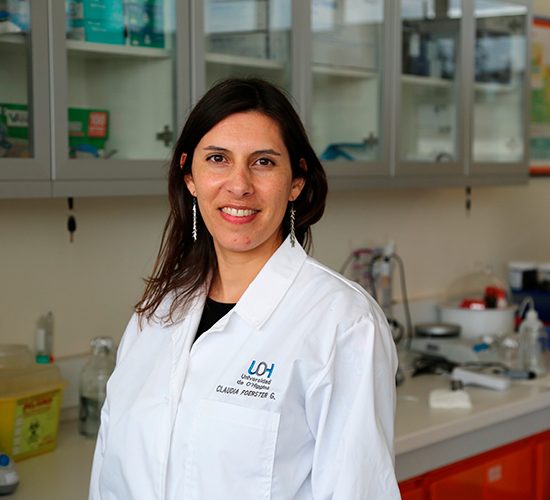Food safety expert: "Foodborne diseases not only produce gastroenteritis; serious and chronic diseases"

We have a bread with a fungus on one of its edges How do we solve that problem normally? We cut that little piece and eat the rest of the dough. Another case: let's cook chicken, but before throwing the prey into the pot, we wash them in the dishwasher. These are two serious mistakes that reflect a lack of food safety culture in the population, explains Claudia Foerster, Institute of Agri-Food Sciences, Animals and Environmentals (ICA3) University of O'Higgins (UOH).
Just because the fungus is not distinguished does not mean that it is not present in the rest of the bread and that there are no toxins produced by them; this is why, you have to throw away the product completely. And chicken should never be washed Why? First, because it's unnecessary; subsequent cooking will eliminate pathogenic microorganisms such as bacteria and viruses. And second, and more importantly, Because, washing them, contaminated water droplets will splash the tarp and cutlery that is normally in the dishwasher.
"Food diseases not only cause stomach pain and gastroenteritis; can also lead to more serious and chronic diseases. There are diseases such as Listeriosis - generated by foods contaminated with the bacterium Listeria monocytogenes-, that can cause meningitis or abortion. Or there's the Escherichia coli Enterohemorrhagic, that can lead to kidney failure, mainly affects children between the age of 2 and 5. In addition, I study mycotoxins, which are toxins that produce fungi. There are a few that decrease immunity and produce gastroenteritis, but aflatoxin, for example, is a proven agent of liver cancer; and there are other substances, pesticide residues that have also been associated with cancer and hormonal changes. That's why we need to pay attention to what we're eating and take the necessary measures to prevent foodborne diseases", explains the specialist.
Claudia Foerster is coordinator of the FIC project "Regional Agri-Food Safety Model", an initiative of the Regional Advisory Commission (CAR) ACHIPIA, Chilean Agency for Food Safety and Quality, whose regional coordinator is seremi Joaquín Arriagada, together with public and private entities in the region that participated in its formulation.
The project is implemented by the Institute of Agri-Food Sciences, Animals and Environmentals (ICA3), University of O'Higgins and funded by the O'Higgins Regional Government's Competitiveness Innovation Fund (Fic) and its Regional Council, framed in the Regional Innovation Strategy. One of its goals is the creation of the first accredited Food Safety Laboratory in the region that will be located on the Colchagua Campus; University of O'Higgins, in the city of San Fernando.
"One of the objectives of this project is to carry out a monitoring system to measure food hazards such as Salmonella, Escherichia coli and faecal coliforms, among others. In addition, we will examine a battery of pesticides in food because, when pesticides are well used, can be beneficial for agricultural production; but misuse can be a chemical hazard. For the project, we'll start by analyzing the lettuces, tomatoes and honey from 30 leading producers in the region", explains. "The idea is for this extension system to reach 600 other producers and INDAP professionals", says.
In this respect, THE Regional Director of INDAP, Juan Garcia, complements that "for us as INDAP, it is very important to collaborate with such programs that seek to train our users and direct and indirect professional and technical teams, such as Technical Advisory Services, Sat, for example. Topics such as Food Safety, they are certainly part of our priorities as an institution of promotion".
Why do they include honey? One might think that honey is harmless in itself.
– Honey alone is safe and has beneficial bacteria (Probiotics) and prebiotics. But the problem is that there are currently diseases affecting bees, like the varroa, and very few chemicals authorized for your control. This can cause acaricides or other undegulated or honey-studied compounds to be used, that could be a danger. Therefore, we want to investigate whether there are any of these pesticides in honey and, Hopefully, don't find anything, Obviously.
The idea is to open the lab in the first half of next year and start testing and then be accredited by the INN, National Institute of Standardization. He adds: "We want the O'Higgins Region to be the national pilot to see how consumer safety culture works. Children are much more permeable to change. We will do educational campaigns to let schoolchildren know how to prevent bacterial contamination, fungi and toxins, because they will be the ones who are going to remind their parents 'that you have to wash your hands before and after cooking or the importance of separating raw foods with those ready for consumption, for example. They're going to make the change", sentence Dr Foerster.
For the moment, there is no evidence that the SARS-CoV-2 virus, COVID-19 can be transmitted through food, says the expert, However, the handwashing campaign has been, rebound, a great contribution to the still fledgling culture of safety.
In the future the idea is to generate a seal associated with the safety model in the region, ICA3 experts work on this together with the Technical Advisory Committee (Cat) project where the seremi participates (s) Nelson Adrian Health, agriculture seremi, Joaquin Arriagada; THE Regional Director of INDAP, Juan Garcia; SAG representatives, HORTICRECE, Liberator's Corporation, Association of Manufacturers and Importers of Agricolas Phytosanitary Products, AFIPA, and the producer organizations participating in the project: Coopeumo, Coagricam, Apiunisexta, and Beekeeping Development Corporation.
Read full note on www.elrancaguino.cl
